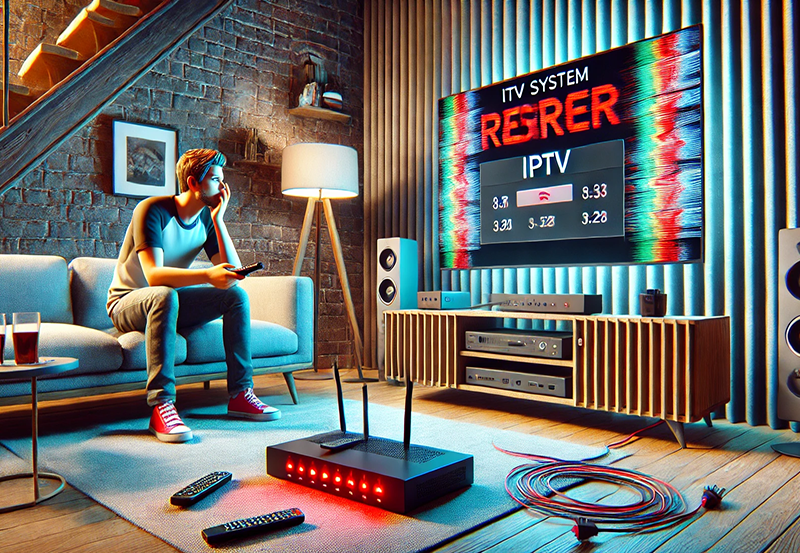With the rising popularity of IPTV, more viewers are turning to Virtual Private Networks (VPNs) to enhance their streaming experience. While VPNs have traditionally been associated with online privacy, their role in IPTV is crucial for secure, unrestricted, and high-quality streaming. This article delves into why VPNs are essential for IPTV users, how they work, and how to set them up effectively.
Buy 1 Year IPTV and Enjoy Unlimited Content
1. Understanding VPNs and How They Work
A VPN, or Virtual Private Network, is a service that encrypts your internet connection and reroutes your IP address through a remote server. This makes your online activity private and secure, shielding it from prying eyes such as ISPs, hackers, and even government agencies. When you use a VPN, your device appears to be connected from the VPN server’s location, which is especially useful for IPTV users who want to bypass geo-restrictions and access a global range of content.
2. Why VPNs Are Essential for IPTV
There are several compelling reasons why VPNs are essential for IPTV users:
- Bypassing Geo-Restrictions: Many IPTV providers offer content that is region-specific. With a VPN, you can connect to servers in different countries, giving you access to content that may be restricted in your area.
- Avoiding ISP Throttling: Internet Service Providers (ISPs) often throttle, or slow down, internet speeds when they detect high-bandwidth activities like streaming. A VPN masks your activity from your ISP, preventing throttling and ensuring smoother streaming quality.
- Enhancing Privacy and Security: A VPN secures your connection with encryption, making it difficult for hackers and other malicious actors to intercept your data. For IPTV users accessing a variety of online content, a VPN adds an essential layer of protection against data theft and security threats.
- Accessing Blocked IPTV Services: Some ISPs block access to certain IPTV services. Using a VPN can help you bypass these blocks, allowing you to enjoy uninterrupted access to your subscription.
3. Choosing the Right VPN for IPTV
Not all VPNs are created equal, and choosing the right one is crucial for a seamless IPTV experience. Here are key features to look for:
- High-Speed Servers: Look for a VPN that offers high-speed servers optimized for streaming. VPNs with large server networks can provide faster, more stable connections, which is essential for avoiding buffering during IPTV streaming.
- No-Logs Policy: Choose a VPN provider with a strict no-logs policy, ensuring that your online activity is not tracked or stored. This is important for maintaining privacy while using IPTV.
- Server Availability and Variety: The best VPNs offer a wide range of servers in multiple countries, allowing you to bypass geo-restrictions and access content from various regions.
- Device Compatibility: A good VPN for IPTV should be compatible with a range of devices, including smart TVs, Android boxes, Fire Stick, and mobile devices, ensuring that you can secure all your streaming setups.
- Customer Support: Look for a VPN provider with reliable customer support, ideally with 24/7 availability. This is helpful in case you encounter connection issues or need assistance with setup.
4. How to Set Up a VPN for IPTV
Setting up a VPN for IPTV is relatively simple and can be done on most devices. Here’s a general guide:
- Step 1: Choose and subscribe to a reputable VPN service with fast speeds and a broad server network.
- Step 2: Download the VPN app on the device you’ll be using for IPTV (such as a smart TV, streaming box, or mobile device).Stream IPTV on PS4 Like a Pro: Easy Steps for Beginners
- Step 3: Open the VPN app, log in, and select a server in the location you wish to connect from. If you want to access geo-restricted content, choose a server in the appropriate region.
- Step 4: Connect to the VPN server, then open your IPTV app and begin streaming as usual. Your connection will now be encrypted, providing you with enhanced security and access to additional content.
Tip: Some VPNs also offer dedicated streaming servers. If available, connect to these for optimized performance on IPTV services.
5. Using a VPN with Different IPTV Devices
- Smart TVs and Streaming Devices: Many smart TVs and streaming devices, like Amazon Fire Stick, support VPNs through dedicated apps. Alternatively, you can configure the VPN directly on your router, which will secure all devices connected to your network.
- Computers and Mobile Devices: Setting up a VPN on a computer or mobile device is typically straightforward with VPN apps available for Windows, macOS, Android, and iOS. Once connected, you can use your IPTV app or browser to access IPTV services securely.
- Routers: Configuring a VPN on your router allows you to protect all devices connected to your network. This method is particularly useful if your streaming device doesn’t support VPN apps directly.
6. Potential Challenges and Solutions
- Speed Issues: Some VPNs may slow down your connection slightly due to encryption. To mitigate this, choose a VPN with high-speed servers, or connect to servers geographically closer to your location.
- Compatibility Issues: If your device doesn’t support VPN apps, consider using a VPN-enabled router or a streaming device with VPN compatibility (like Fire Stick or Android TV).
- Blocked VPN Connections: Occasionally, IPTV services or ISPs may detect and block VPN connections. In this case, switching to a different server or using obfuscated servers (available on some VPNs) can help you bypass these blocks.
Conclusion
Using a VPN with IPTV enhances security, provides access to geo-restricted content, and prevents ISP throttling, ensuring a smoother and more flexible streaming experience. By understanding how VPNs work, selecting the right service, and setting it up correctly on your device, you can make the most of your IPTV subscription without restrictions. VPNs are not only a valuable tool for privacy but are essential for maximizing the full potential of IPTV.A Beginner’s Guide to Configuring GSE IPTV for Optimal Performance





